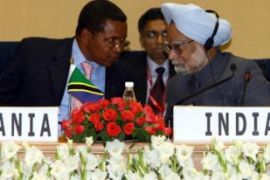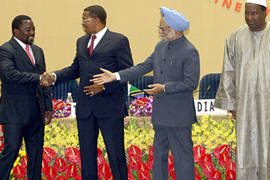India seeks ties in Africa
First trade summit between Africa and India focuses on trade and investment.

Published On 9 Apr 2008
Jakaya Mrisho Kikwete, the Tanzanian president, noted that “food security and high oil prices clearly impact on our economies”.
“We agreed there was need for intervention … that we should bring these two matters to the attention of the United Nations, the World Bank and the International Monetary Fund in particular,” he said.
On climate change, Kikwete said that since nations contributed differently to global warming, it was necessary to “uphold the principal of common but differential responsibility”.
He thanked Manmohan Singh, the Indian prime minister, for offering increased project aid and preferential market access for African exports.
‘Equal partners’
Alpha Oumar Konare, the head of the African Union, said the meeting had “truly understood” the continent’s needs and aspirations.
“Today, Africa does not need a guiding hand … we are equal partners in this race like everyone else,” he said, adding that Africa could benefit from the advances made by India in health, information technology and agriculture.
 |
| Manmohan Singh, second right, [EPA] |
Moses Wetangula, Kenya’s foreign minister, stressed the need to implement decisions taken at the summit.
“We must be able to ‘walk the talk’ for the sake of the peoples of our countries,” he said.
Singh said the meeting was “held in an atmosphere of great warmth and sense of partnership”.
It “laid the firm foundations on which to build the new framework of co-operation”, he said.
On food security, Singh said that the economies of India and Africa “must acquire the momentum to meet food needs … through domestic production”.
The summit gathered the leaders of the Democratic Republic of Congo, Nigeria, South Africa, Ethiopia and Tanzania, among others.
Huge Influence
An unflinching supporter of Africa’s independence struggle against colonialism, India once enjoyed close ties and wielded considerable influence with many African countries.
But analysts say New Delhi’s focus on the United States and Europe since launching market reforms in 1991 has eroded its support base in Africa, while countries such as China and Japan have made great inroads.
China’s bilateral trade with Africa stood at 56 billion dollars annually in 2007-08, while India’s trade with the continent totalled $30billion, according to government figures.
With India’s economy growing at nearly nine per cent a year, New Delhi is looking at Africa’s vast mineral and hydrocarbon resources to help fuel its growth.
The Africa-India Framework for Co-operation approved at the summit pledged to boost trade and investment, share expertise in agriculture, science, technology, water management and education.
The African nations also agreed to back India’s candidacy for an expanded UN Security Council, while India said it would support an African presence on the council.
Both sides said it was necessary to “democratise” leading international organisations like the UN.
Source: News Agencies